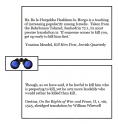Get up early to kill him first
[ by Charles Cameron — from Tractate Sanhedrin and Grotius to Gershon Scholem and the power of names ]
.
I ran across Yonatan Mendel‘s post, Kill Him First, in the Jewish Quarterly today while searching for the Habrew of the phrase get up early to kill him first, which I wanted to pair with the quote from Hugo Grotius which is pretty obviously derived from it:
**
I arrived at that page, in other words, looking for the phrase Ha-Ba le-Horgekha Hashkem le-Horgo, and was glad to find it there, along with a fascinating narrative of some of the times it has been quoted in recent Israeli political circles:
Following the Second Lebanon War, Ehud Yatom, a Likud MK, explained the asymmetrical death toll of 44 Israeli civilians and 1,191 Lebanese civilians with the same trump card: ‘and if someone comes to kill you, get up early to kill him first.’ It has been used by Minister of Strategic Affairs Moshe Ya’alon when addressing university students about their military reserve service and by Minister of Public Security Avi Dichter when lecturing about IDF strategy. It was also the explanation provided by Minister of Minorities Avishai Braverman for the assassination of a Hamas leader in Dubai. Even Ayoub Kara, a Druze MK from Likud, has used it. When asked about the Iranian nuclear plan Kara showed little originality: ‘I think an attack on Iran will be justifi ed’, he said, ‘since if someone comes to kill you, get up early to kill him first.’
**
But, but.
That’s not the real treasure. For me, the real treasure is in the quote that heads Mendel’s article, from the great schoilar of Kabbalah Gershom Scholem in his 1926 letter to Franz Rosenzweig, On Our Language: A Confession. Here’s Mendel’s quote:
The people here are not aware of the significance of their acts. They only think they have turned Hebrew into a secular language. That they have released the apocalyptic sting out of it… but God will not remain silent in the language in which he was invoked again and again, thousands of times, to return into our lives.
Scholem’s whole letter is a powerful poetic testament:
Language is name. The power of language is enclosed in the name; the abyss of language is sealed within it..
